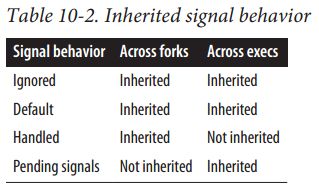Linux System Programming 学习笔记(十) 信号
1. 信号是软中断,提供处理异步事件的机制
异步事件可以是来源于系统外部(例如用户输入Ctrl-C)也可以来源于系统内(例如除0)
内核使用以下三种方法之一来处理信号:
(1)
忽略该信号。
SIGKILL和SIGSTOP不能被忽略。
(2)
捕捉并且处理该信号。The kernel will suspend execution of the process’s current code path and jump to a previously registered function.
SIGKILL和SIGSTOP不能被捕捉
(2)
执行默认操作。
SIGCHLD:进程终止时,内核向其父进程发送SIGCHLD信号,默认是忽略,如果父进程需要子进程终止信息,而需要显式处理,通常是调用wait函数
SIGINT:用户输入中断字符 Ctrl-C
SIGKILL,SIGSTOP:kill系统调用发出的信号,不能被忽略,不能被捕捉,结果总是终止进程
SIGSEGV:段错误
2. 基本的信号管理
#include <signal.h> typedef void (*sighandler_t)(int); sighandler_t signal (int signo, sighandler_t handler);
signal() removes the current action taken on receipt of the signal signo and instead handles the signal with the signal handler specified by handler
#include <stdlib.h> #include <stdio.h> #include <unistd.h> #include <signal.h> /* handler for SIGINT and SIGTERM */ static void signal_handler (int signo) { if (signo == SIGINT) printf ("Caught SIGINT!\n"); else if (signo == SIGTERM) printf ("Caught SIGTERM!\n"); else { /* this should never happen */ fprintf (stderr, "Unexpected signal!\n"); exit (EXIT_FAILURE); } exit (EXIT_SUCCESS); } int main (void) { /* * Register signal_handler as our signal handler * for SIGINT. */ if (signal (SIGINT, signal_handler) == SIG_ERR) { fprintf (stderr, "Cannot handle SIGINT!\n"); exit (EXIT_FAILURE); } /* * Register signal_handler as our signal handler * for SIGTERM. */ if (signal (SIGTERM, signal_handler) == SIG_ERR) { fprintf (stderr, "Cannot handle SIGTERM!\n"); exit (EXIT_FAILURE); } /* Reset SIGPROF's behavior to the default. */ if (signal (SIGPROF, SIG_DFL) == SIG_ERR) { fprintf (stderr, "Cannot reset SIGPROF!\n"); exit (EXIT_FAILURE); } /* Ignore SIGHUP. */ if (signal (SIGHUP, SIG_IGN) == SIG_ERR) { fprintf (stderr, "Cannot ignore SIGHUP!\n"); exit (EXIT_FAILURE); } for (;;) pause (); return 0; }
#include <signal.h> int sigaction (int signo, const struct sigaction *act, struct sigaction *oldact); struct sigaction { void (*sa_handler)(int); /* signal handler or action */ void (*sa_sigaction)(int, siginfo_t *, void *); sigset_t sa_mask; /* signals to block */ int sa_flags; /* flags */ void (*sa_restorer)(void); /* obsolete and non-POSIX */ };
sigaction() changes the behavior of the signal identified by signo, signo不能为SIGKILL和SIGSTOP
If act is not NULL, the system call changes the current behavior of the signal as specified by act
信号行为的继承:

3. 发送信号
int ret; ret = kill (1722, SIGHUP); if (ret) perror ("kill");
上述代码表示:向pid为1722的进程发送SIGHUP信号
上述代码与以下shell语句等同:
$ kill -HUP 1722
/* a simple way for a process to send a signal to itself */ #include <signal.h> int raise (int signo);
raise (signo);
等同于:
kill (getpid (), signo);
4. 可重入
A reentrant function is a function that is safe to call from within itself (or concurrently, from another thread in the same process).
为了确保可重入,函数
不能操作static变量,只能操作 stack-allocated data,并且不能调用 不可重入函数